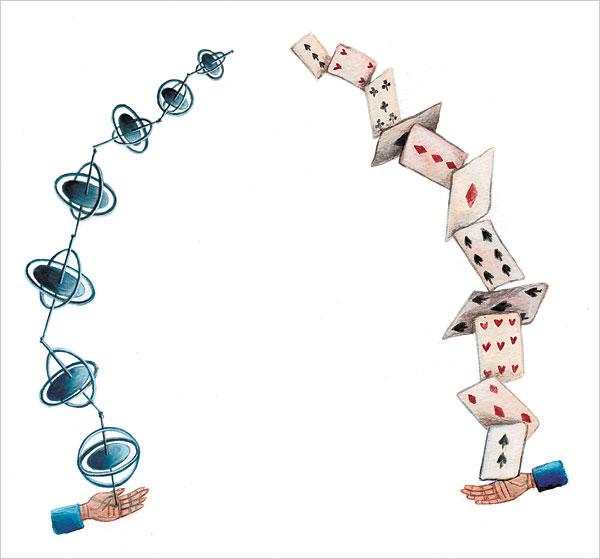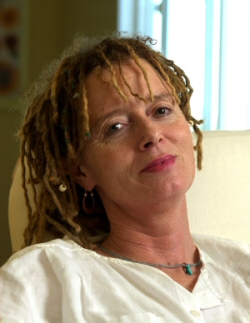The Wizard Drops the Curtain – New York Times
I attended Berkshire Hathaway’s annual meeting and wrote about it for The New York Times Op-Ed page:
THE Berkshire Hathaway Corporation held its annual shareholders meeting here last weekend, drawing a record 27,000 capitalist faithful from all over the world to worship at the Qwest Center in downtown Omaha. Onstage, the chairman and investor in chief Warren Buffett and his partner and vice chairman, Charles Munger, once again entertained the well-washed and well-heeled masses and educated them in the doctrine of value investing.
And what’s not to worship? Berkshire shareholders gained $16.9 billion in net worth last year alone, an 18.4 percent increase in per share book value. Even more fun, the guy in charge, despite being the second-wealthiest man in the world, is a prize ham who loves to play his ukulele, show a video of himself “winning” a rigged one-on-one game against LeBron James of the Cleveland Cavaliers, and then kick off the shareholder meeting by sending the singer Jimmy Buffett onstage to pretend he is a distant cousin who believes “that blood is thicker than water” and therefore he — the Margaritaville Man — should be Mr. Buffett’s successor.
Succession was much discussed at both Saturday’s shareholder Q. and A. session and at the Sunday press conference that was sandwiched between the shareholder-only shopping day at Borsheim’s Fine Jewelry and the annual dinner at Gorat’s Steak House. Warren Buffett is 76 years old, and Mr. Munger is 83. Nobody sitting with me in that audience wanted to think about anybody but Mr. Buffett in charge; his talk of stepping down is as if the Wizard himself, in an unwelcome inversion of Oz protocol, keeps calling attention to his own mortality.
On the operations side of Berkshire Hathaway, Mr. Buffett tells the crowd, he has three outstanding candidates who could replace him as chief executive, and that Berkshire’s board of directors knows exactly how to proceed and who should take over if he should “die tonight.” On the investment side, Berkshire is not as well prepared. In the short term, Mr. Buffett says that he would rely on Lou Simpson, the portfolio manager of Geico insurance (a Berkshire subsidiary), to fill in for him if the need arose. But Mr. Simpson is only six years younger than Mr. Buffett, and Berkshire is looking for a candidate who could stay in charge for the long haul.
Mr. Buffett and Mr. Munger, therefore, propose to find a person or persons with a proven ability to invest large sums and to whom they could entrust a chunk of cash — say, “just a few billion or so” — in a portfolio of investments that could quickly be enlarged, if performance warranted, to the near-hundred-billion dollars managed by the Wizard himself.
Despite all the talk about a viable successor, Mr. Buffet looked to be in good health and has no plans to retire. He merrily fielded questions about his diet while washing down See’s chocolates with regular Coke (“I hate diet anything”). He attributes his continuing vigor to never smoking or drinking alcohol, to calories (“I like lots of calories”), to the longevity of his ancestors, and to the lack of “job stress.”
He was his usual self at the microphone, making impromptu riffs laced with wisecracks, concrete investment wisdom, jokes and an encyclopedic recall of the history of investing, with special attention to debacles brought on by the hubris of anybody who tried to get rich quick. If a reverie takes him off into a flight of high-level financial jargon on how executives are compensated, he immediately catches himself and abruptly summarizes with homespun wisdom like, “Compensation committees are cocker spaniels when they should be Dobermans.”
The proceedings weren’t all merrymaking. Environmentalists and members of Indian tribes begged Mr. Buffett to have the Berkshire subsidiary PacifiCorp remove hydroelectric dams from the Klamath River in northern California. And after the Q. and A. session, Mr. Buffett allotted half an hour for shareholders to enter pleas for Berkshire to reconsider its investment in PetroChina, a subsidiary of China National Petroleum, on the theory that the parent company does business in Sudan and therefore theoretically contributes to the genocide there. Mr. Buffett was respectful and politic, even visibly moved, but also of the opinion that he could not influence either matter. All in all, the faithful seem unenthusiastic about the search for a successor. Perhaps Berkshire could invest in anti-aging technologies, or maybe a biotech outfit that could clone the man whom Charles Munger referred to at one point as “a ferocious learning machine.”
As Mr. Buffet answered questions over the weekend, the list of his successor’s essential qualifications seemed to grow. Any candidate, or candidates, should be able to “see around corners” and be “wired to detect risks” including new and unforeseen investment hazards for which the past offers no guidance. In line with Mr. Buffett and Mr. Munger’s antipathy for lavish executive compensation, Berkshire’s new stock picker in chief would be expected to remain at the helm for the long term, even though he or she could make more elsewhere.
A few times Mr. Buffett expressed the fear that his successor would be the type of investor who would make 99 intelligent decisions and then one fatal blunder. Both he and Mr. Munger characteristically played down expectations, proclaiming that managing $100 billion in assets is like steering an ocean liner and that no one managing such a vast enterprise could hope to beat the Standard & Poor’s 500 by more than 10 percent per year. Instead they’d be more than pleased to find an investor who could outperform major stock indexes by several points and not make any huge blunders.
Even though Mr. Buffett says that he personally thinks better and more clearly in Omaha than he does in New York (“less chatter”), his successor will not be required to live here. His replacement could live anywhere, because all that is really required is “the same information everybody else has and a quiet room to think in.”
Hmmm. That’s a tough one for us Omahans to take. Still, we might be appeased if this successor met a few other qualifications. First, any new chairman or investor in chief of Berkshire Hathaway should be able to play the board to finesse the king-jack of trump at bridge when the bid is seven spades. The candidate should also be able to strum the ukulele; live in a house in central Omaha that he purchased in 1958 for $31,500; and be willing to appear with Regis Philbin on a mock game show, “Who Wants to Be a Jillionaire?”, and then leave in disgust when told the prize is only a billion.
This person should also have read every book on investments in the Omaha Public Library (some of them twice) before age 10, should be a disciple of the economist Benjamin Graham; should be in love with investing and returns but care little for spending the money; should be able to donate more than $30 billion to the Bill and Melinda Gates foundation; should be above all else funny and … well, there may be more.
Richard Dooling, Omaha


